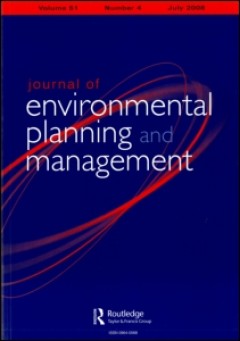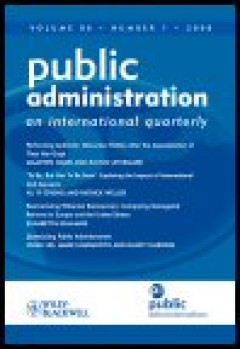Filter by

Transboundary governance of the Curonian Spit World Heritage Site
This study describes the governance and management structures of the Curonian Spit World Heritage Site, a transboundary protected area shared by Lithuania and the Russian Federation. Focusing on the national park authorities it presents the site from a local administrative perspective. The paper shows that due to strong state level influence and a lack of full stakeholder inclusion, different p…
- Edition
- Volume 53, Issue 6 September 2010 , pages 725 - 74
- ISBN/ISSN
- 09640568
- Collation
- -
- Series Title
- Journal of Environmental Planning and Management
- Call Number
- -

The importance of skillful community leaders: understanding municipal pestici…
This paper focuses on policy change under scientific uncertainty. This is done by exploring two case studies of Canadian pesticide policy evolution applied to Sabatier's 'Advocacy Coalition Framework'. 'Stakeholder' and 'narrative policy' analyses are emphasised to understand pesticide policy changes in Calgary (public education without a restrictive by-law) and Halifax (restrictive by-law). Th…
- Edition
- Volume 53, Issue 6 September 2010 , pages 743 - 75
- ISBN/ISSN
- 09640568
- Collation
- -
- Series Title
- Journal of Environmental Planning and Management
- Call Number
- -

Renewable natural resources from the view of oil dependent countries: the cas…
Increases in oil prices induce various economic and political impacts, such as greater attention being given to renewable substitute alternatives. From this perspective, this study provides some descriptive statistics and univariate estimations for one of the countries that cannot meet its demand for petroleum. Biofuel, one of the examples of renewable natural resources, may have a great potent…
- Edition
- Volume 53, Issue 6 September 2010 , pages 759 - 76
- ISBN/ISSN
- 09640568
- Collation
- -
- Series Title
- Journal of Environmental Planning and Management
- Call Number
- -

Objectives of public economic policy and the adaptation to climate change
Much can be learned about adaptation by applying structures and methodologies already used in other research fields. This study employs a public economic policy approach to investigate how - or if at all - adaptation should be supported by the public sector. Three different fields of adaptation activity are identified which are especially relevant for government intervention and the study propo…
- Edition
- Volume 53, Issue 6 September 2010 , pages 767 - 79
- ISBN/ISSN
- 09640568
- Collation
- -
- Series Title
- Journal of Environmental Planning and Management
- Call Number
- -

LCA of the South African sugar industry
A life cycle assessment of sugar produced in South Africa evaluates the environmental impacts and energy consumption of the different life cycle phases of sugar production. The system studied includes sugar cane farming, fertiliser and herbicide manufacture, cane burning, sugar cane transportation and sugar manufacture. Inventory and impact assessment results show that non-renewable energy cons…
- Edition
- Volume 53, Issue 6 September 2010 , pages 793 - 80
- ISBN/ISSN
- 09640568
- Collation
- -
- Series Title
- Journal of Environmental Planning and Management
- Call Number
- -

Modelling visitor groups' intentions to displace from an urban trail: a combi…
Depending on gender and activity, overcrowding and safety concerns may detract from urban green space use. Differences in use displacement intentions from a recreational trail in a forest in Vienna were investigated for male and female walkers as well as male and female dog-walkers (N = 425) using an image-based stated preference model. The trail scenarios were depicted as digitally calibrated …
- Edition
- Volume 53, Issue 6 September 2010 , pages 809 - 82
- ISBN/ISSN
- 09640568
- Collation
- -
- Series Title
- Journal of Environmental Planning and Management
- Call Number
- -

Remotely engaged? Towards a framework for monitoring the success of stakehold…
The importance of stakeholder engagement for the success of natural resources management processes is widely acknowledged, yet evaluation frameworks employed by administrators of environmental programmes continue to provide limited recognition of or insistence upon engagement processes. This paper presents a framework for monitoring and evaluation of engagement that aims to better incorporate c…
- Edition
- Volume 53, Issue 7 October 2010 , pages 827 - 845
- ISBN/ISSN
- 09640568
- Collation
- -
- Series Title
- Journal of Environmental Planning and Management
- Call Number
- -

Traditional pastoralist decision-making processes: lessons for reforms to wat…
The purpose of this paper is to consider the vision for public participation in water resources management embedded in Kenya's 2002 Water Act, as it relates to pastoralists. The Act envisions that responsibility for management of water resources at the local level will be devolved to community-level bodies. Our approach was qualitative and included interviews with government officials and Gabra…
- Edition
- Volume 53, Issue 7 October 2010 , pages 847 - 862
- ISBN/ISSN
- 09640568
- Collation
- -
- Series Title
- Journal of Environmental Planning and Management
- Call Number
- -

A GIS-based technique for linking landscape characteristics to non-point sour…
A Nitrate-N Leaching Index (NLI) is calculated and the results indicate that nitrogen loss in the study area occurs through both leaching and surface runoff. A non-linear regression model of trapping efficiency was combined with a first order decay model to examine the impact of soil characteristics, slope, vegetative cover, land use and distance to streams on the spatial pattern of non-point s…
- Edition
- Volume 53, Issue 7 October 2010 , pages 863 - 882
- ISBN/ISSN
- 09640568
- Collation
- -
- Series Title
- Journal of Environmental Planning and Management
- Call Number
- -

The influence of a voluntary fee in the consumption of plastic bags on superm…
Since 2007, some supermarkets in Portugal have voluntarily abolished the free distribution of plastic bags, implementing a symbolic charge of �0.02 each at the same time that others still offer free plastic bags. This study assesses the influence of this voluntary measure on the reduction of plastic bags consumption, comparing clients from supermarkets that have adopted it with others who have …
- Edition
- Volume 53, Issue 7 October 2010 , pages 883 - 889
- ISBN/ISSN
- 09640568
- Collation
- -
- Series Title
- Journal of Environmental Planning and Management
- Call Number
- -

Does intensity of change matter? Factors affecting adoption of agri-environme…
Agri-environmental schemes (AES) are the main policy instrument currently available in the EU to promote environmentally-friendly farming practices. However, the rate of adoption of these measures is still relatively low in southern Europe, and understanding how these rates can be increased is still an open issue. The goal of this paper is to increase that understanding by testing whether the f…
- Edition
- Volume 53, Issue 7 October 2010 , pages 891 - 905
- ISBN/ISSN
- 09640568
- Collation
- -
- Series Title
- Journal of Environmental Planning and Management
- Call Number
- -

Impact assessment of a hydroelectric project on the flora in the Western Hima…
This study provides an overview of the impacts of a proposed hydroelectric power project in the Western Himalayan region in India, using a primary database on floristic diversity and vegetation analysis. The remote sensing data revealed that in the submergence zone only mixed deciduous forest that occupies 807.5 ha area and has a wood biomass volume of 4,027,503 m3 is likely to be lost due to i…
- Edition
- Volume 53, Issue 7 October 2010 , pages 907 - 923
- ISBN/ISSN
- 09640568
- Collation
- -
- Series Title
- Journal of Environmental Planning and Management
- Call Number
- -

Increasing the public benefits of agricultural conservation easements: an ill…
Agricultural conservation easements (ACEs) involve the significant expenditure of public funds through either tax benefits and/or direct public expenditures. The selection of agricultural parcels for conservation should, therefore, maximise net public benefits to the extent possible within financial constraints and the need for agricultural viability to maintain working landscapes. Some program…
- Edition
- Volume 53, Issue 7 October 2010 , pages 925 - 945
- ISBN/ISSN
- 09640568
- Collation
- -
- Series Title
- Journal of Environmental Planning and Management
- Call Number
- -

Village pubs as a social propellant in rural areas: an econometric study
There is no place like England to witness the role of pubs as a social networking hotspot. Social networks lie at the foundations of most of the social and economic interactions of individuals. The aim of this paper is to assess the importance of pubs as natural locations for the development of social networks and how their presence affects the socio-economic activity of a given area or region.…
- Edition
- Volume 53, Issue 7 October 2010 , pages 947 - 962
- ISBN/ISSN
- 09640568
- Collation
- -
- Series Title
- Journal of Environmental Planning and Management
- Call Number
- -

The Temporal Emotion Work of Motherhood: Homeschoolers’ Strategies for Mana…
Drawing on fieldwork and in-depth interviews with homeschooling mothers in the Pacific Northwest, the author reveals several ways the temporal experience of motherhood was emotionally problematic. The intensive demands of homeschooling left them stressed and dissatisfied with the amount of time they had to pursue their own interests. Mothers tried to allocate their time differently to manage th…
- Edition
- Vol. 24 no. 4, August 5, 2010.pp. 421-446
- ISBN/ISSN
- 08912432
- Collation
- -
- Series Title
- Gender & Society
- Call Number
- -

Working-Class Job Loss, Gender, and the Negotiation of Household Labor
Scholars see the gendered division of household labor as a stronghold of gender inequality. We explore changes in household labor and gender relations when conservative, working-class families experience employment disruptions. Using data from 49 qualitative interviews conducted with men and women following the forced unemployment of breadwinning husbands, we observe some change in gendered hou…
- Edition
- Vol. 24 no. 4, August 5, 2010.pp. 447-474
- ISBN/ISSN
- 08912432
- Collation
- -
- Series Title
- Gender & Society
- Call Number
- -

“Practicing Electoral Politics in the Cracks”:Intersectional Consciousnes…
Previous research on gender and political leadership has narrowly defined gender consciousness, failing to account for the broader commitments, concerns, and loyalties held by women of color. In this article, the author calls for an intersectional approach to analyzing the gender consciousness of political leaders. She presents findings from four months of participant observation in a Latina ca…
- Edition
- Vol. 24 no. 4, August 5, 2010.pp. 475-498
- ISBN/ISSN
- 08912432
- Collation
- -
- Series Title
- Gender & Society
- Call Number
- -

Children’s Surnames, Moral Dilemmas: Accounting for the Predominance of Fat…
This content analysis examines online accounts of choices of marital and child surnames to understand the predominance of exclusively patrilineal surnames. I demonstrate how surnaming processes present the classic tension between commitment to self and others as moral dilemmas of self versus family, children, and spouse. Social and cultural mechanisms create an either/or exclusive framing and a…
- Edition
- Vol. 24 no. 4, August 5, 2010. pp. 499-525
- ISBN/ISSN
- 08912432
- Collation
- -
- Series Title
- Gender & Society
- Call Number
- -

Anticipating Infertility: Egg Freezing, Genetic Preservation, and Risk
This article discusses the new reproductive technology of egg freezing in the context of existing literature on gender, medicalization, and infertility. What is unique about this technology is its use by women who are not currently infertile but who may anticipate a future diagnosis. This circumstance gives rise to a new ontological category of �anticipated infertility.� The author draws on par…
- Edition
- Vol. 24 no. 4. August 5, 2010.pp. 526-545
- ISBN/ISSN
- 08912432
- Collation
- -
- Series Title
- Gender & Society
- Call Number
- -

POWER AND INTERACTIVE POLICY-MAKING: A COMPARATIVE STUDY OF POWER AND INFLUEN…
A number of countries use forms of interactive policy-making to increase the influence of citizens on decision making. Since there has also been an increase in citizen participation in The Netherlands over the last decade, in this paper, we provide a comparative analysis of 8 interactive projects initiated by the Dutch central government. The central aim of the paper is to understand processes …
- Edition
- Volume 88, Issue 3, September 2010, pages 609–626
- ISBN/ISSN
- 00333298
- Collation
- -
- Series Title
- Public Administration
- Call Number
- -
 Computer Science, Information & General Works
Computer Science, Information & General Works  Philosophy & Psychology
Philosophy & Psychology  Religion
Religion  Social Sciences
Social Sciences  Language
Language  Pure Science
Pure Science  Applied Sciences
Applied Sciences  Art & Recreation
Art & Recreation  Literature
Literature  History & Geography
History & Geography